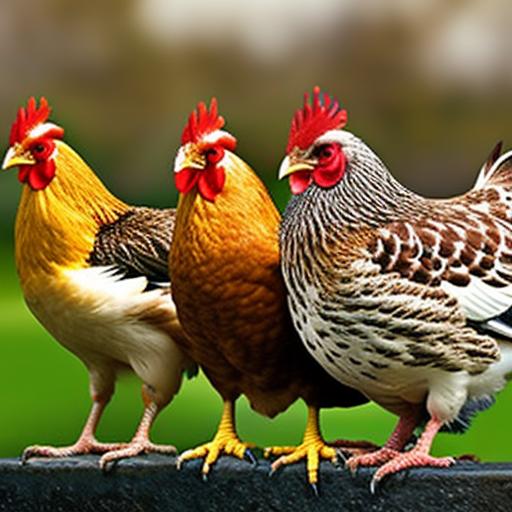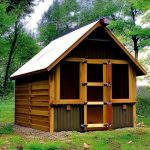Keeping chickens in a shed refers to the practice of housing chickens in a dedicated structure, typically a shed, rather than allowing them to roam freely in a backyard or farm. This method of chicken keeping has been gaining popularity in recent years, as more people are becoming interested in raising their own food and enjoying the benefits of fresh eggs. By keeping chickens in a shed, owners can provide them with protection from predators and harsh weather conditions, while also enjoying the convenience of having their feathered friends close to home.
Key Takeaways
- Keeping chickens in a shed is a great way to have fresh eggs and meat at home.
- Benefits of keeping chickens in a shed include pest control, fertilizer production, and reduced food waste.
- Choosing the right shed for your chickens involves considering size, ventilation, and insulation.
- Setting up a coop inside a shed requires providing nesting boxes, perches, and bedding.
- Feeding and watering your chickens in a shed requires providing clean water and a balanced diet.
Benefits of Keeping Chickens in a Shed
One of the main benefits of keeping chickens in a shed is the protection it provides from predators. Chickens are vulnerable to attacks from predators such as foxes, raccoons, and even neighborhood dogs. By housing them in a shed, owners can ensure that their chickens are safe and secure, reducing the risk of losing them to predators.
Another benefit is protection from harsh weather conditions. Extreme heat or cold can be detrimental to chickens’ health and well-being. A shed provides insulation and shelter, keeping the chickens comfortable and protected from the elements. This is especially important during winter months when temperatures can drop below freezing.
Having chickens in a shed also offers convenience for owners. With the chickens housed nearby, it is easier to monitor their health and well-being. It also makes it more convenient to collect eggs and provide food and water for the chickens. Additionally, having chickens close by allows owners to enjoy their company and observe their behavior more closely.
Choosing the Right Shed for Your Chickens
Choosing the right shed for your chickens is crucial for their well-being and comfort. There are several factors to consider when selecting a shed for your feathered friends.
Firstly, size is an important consideration. The shed should be spacious enough to accommodate the number of chickens you plan to keep. As a general rule of thumb, each chicken should have at least 4 square feet of space. This allows them to move around comfortably and engage in natural behaviors such as scratching and dust bathing.
Ventilation is another important factor to consider. Proper ventilation is essential for maintaining good air quality and preventing the buildup of ammonia from chicken droppings. The shed should have windows or vents that can be opened to allow fresh air to circulate.
The materials used to construct the shed are also important. The shed should be made of sturdy materials that can withstand the elements and protect the chickens from predators. It should also be easy to clean and maintain.
Setting up a Coop inside a Shed
Once you have chosen the right shed for your chickens, it is important to set up a coop inside the shed. The coop is where the chickens will sleep, lay eggs, and spend most of their time.
When setting up the coop, it is important to provide enough space for the chickens. As mentioned earlier, each chicken should have at least 4 square feet of space. This allows them to move around comfortably and prevents overcrowding, which can lead to stress and aggression.
Nesting boxes are also essential for a chicken coop. These are where the chickens will lay their eggs. Each nesting box should be large enough for a chicken to comfortably enter and exit, and should be filled with clean bedding such as straw or wood shavings.
In addition to space and nesting boxes, it is important to provide perches for the chickens to roost on. Chickens naturally roost at night, so providing perches allows them to engage in this natural behavior.
Feeding and Watering Your Chickens in a Shed
Feeding and watering your chickens in a shed is an important aspect of their care. It is important to provide fresh water and a balanced diet to ensure their health and well-being.
Chickens should have access to fresh water at all times. This can be provided through waterers or troughs that are easy to clean and refill. It is important to regularly check and clean the water containers to prevent the buildup of bacteria.
In terms of diet, chickens require a balanced feed that provides them with the necessary nutrients. This can be in the form of commercial chicken feed, which is formulated to meet their nutritional needs. In addition to feed, chickens also enjoy foraging for insects and vegetation, so it is beneficial to provide them with access to a small outdoor area where they can scratch and peck.
Maintaining a Clean and Healthy Shed

Maintaining a clean and healthy shed is essential for the well-being of your chickens. Regular cleaning and disinfecting helps prevent the buildup of bacteria and parasites that can cause disease.
Cleaning the shed involves removing any droppings, soiled bedding, and debris. This can be done using a shovel or rake. Once the shed is clean, it is important to disinfect it using a poultry-safe disinfectant. This helps kill any remaining bacteria or parasites.
It is also important to regularly replace bedding in the coop. Bedding such as straw or wood shavings helps absorb moisture and odor, keeping the coop clean and dry.
Temperature and Lighting Considerations for Your Shed
Temperature and lighting are important considerations when keeping chickens in a shed. Chickens are sensitive to temperature extremes, so it is important to regulate the temperature inside the shed.
During hot weather, it is important to provide shade and ventilation to keep the shed cool. This can be done by opening windows or vents, using fans, or providing shade cloth. It is also important to provide fresh water at all times to help keep the chickens hydrated.
During cold weather, it is important to provide insulation and heat sources to keep the shed warm. Insulating the walls and roof of the shed helps retain heat. Heat sources such as heat lamps or heated pads can also be used to provide additional warmth.
In terms of lighting, chickens require a certain amount of light to maintain their health and egg production. Natural light is ideal, so it is important to have windows or skylights in the shed to allow sunlight to enter. If natural light is not sufficient, artificial lighting can be used to supplement.
Ensuring Adequate Ventilation in Your Shed
Proper ventilation is crucial in a chicken shed to maintain good air quality and prevent the buildup of ammonia from chicken droppings. Adequate ventilation helps remove moisture, odors, and harmful gases from the shed.
There are several ways to ensure adequate ventilation in a chicken shed. One way is to have windows or vents that can be opened to allow fresh air to circulate. These should be positioned in a way that allows for cross ventilation, with air entering from one side of the shed and exiting from the other.
It is also important to have vents near the roof of the shed to allow hot air to escape. This helps regulate the temperature inside the shed, especially during hot weather.
Regularly cleaning and removing soiled bedding also helps improve ventilation by reducing the buildup of ammonia and odors.
Common Challenges of Keeping Chickens in a Shed
While keeping chickens in a shed has many benefits, there are also some common challenges that owners may face.
One challenge is pests such as mites, lice, and rodents. These pests can infest the shed and cause harm to the chickens. Regular cleaning and disinfecting helps prevent infestations, but it is also important to regularly inspect the chickens for signs of pests and treat them accordingly.
Diseases are another common challenge. Chickens can be susceptible to various diseases, some of which can be transmitted through contaminated water or feed. It is important to practice good biosecurity measures, such as providing clean water and feed, and regularly disinfecting the shed and equipment.
Another challenge is noise and odor. Chickens can be noisy, especially when they are laying eggs or disturbed. The odor from chicken droppings can also be unpleasant. It is important to consider the proximity of the shed to neighbors and take steps to minimize noise and odor, such as using soundproofing materials and regularly cleaning the shed.
Is Keeping Chickens in a Shed Right for You?
Keeping chickens in a shed offers many benefits, such as protection from predators and weather conditions, as well as the convenience of having chickens close to home. However, it also comes with its own set of challenges, such as pests and diseases.
Before deciding to keep chickens in a shed, it is important to carefully consider if this practice is right for you. Assess your available space, time commitment, and willingness to address the challenges that may arise.
If you decide that keeping chickens in a shed is right for you, take the time to choose the right shed, set up a proper coop, provide adequate food and water, maintain cleanliness, regulate temperature and lighting, ensure ventilation, and address any challenges that may arise.
By following these guidelines and providing proper care for your chickens, you can enjoy the benefits of fresh eggs and the companionship of these charming creatures.
If you’re considering keeping chickens in a shed, you may also be interested in learning about the importance of chicken coop door size. Having the right size door is crucial for the safety and comfort of your feathered friends. To find out more about this topic, check out this informative article on Poultry Wizard: https://poultrywizard.com/keeping-chickens/chicken-coop-door-size/. Additionally, if you’re in search of a reliable and spacious chicken coop, the Producers Pride Sentinel Chicken Coop is worth considering. Discover its features and benefits by visiting: https://poultrywizard.com/keeping-chickens/producers-pride-sentinel-chicken-coop/. Lastly, if you’re a fan of Hannah Montana and want to add a touch of fun to your chicken coop, the Hannah Montana Chicken Coop might be just what you’re looking for. Learn more about this unique coop design here: https://poultrywizard.com/keeping-chickens/hannah-montana-chicken-coop/.
FAQs
What are the basic requirements for keeping chickens in a shed?
To keep chickens in a shed, you need to ensure that the shed is well-ventilated, has enough space for the chickens to move around, and is secure from predators. You also need to provide them with nesting boxes, perches, and access to food and water.
Is it legal to keep chickens in a shed?
The legality of keeping chickens in a shed varies depending on your location. Some cities and towns have specific regulations regarding the keeping of chickens, while others do not. It is important to check with your local authorities before keeping chickens in a shed.
What are the advantages of keeping chickens in a shed?
Keeping chickens in a shed can provide them with a safe and secure environment, protect them from predators, and keep them warm during the colder months. It can also be a more convenient option for those with limited outdoor space.
What are the disadvantages of keeping chickens in a shed?
Keeping chickens in a shed can lead to poor air quality if the shed is not properly ventilated. It can also be more difficult to maintain cleanliness and prevent the spread of disease. Additionally, chickens may not have access to natural sunlight and outdoor space, which can impact their health and well-being.
What type of shed is best for keeping chickens?
The best type of shed for keeping chickens is one that is well-ventilated, secure, and has enough space for the chickens to move around. It should also have windows or skylights to provide natural light and access to the outdoors if possible. A shed with a concrete floor can be easier to clean and maintain.
Meet Walter, the feathered-friend fanatic of Florida! Nestled in the sunshine state, Walter struts through life with his feathered companions, clucking his way to happiness. With a coop that’s fancier than a five-star hotel, he’s the Don Juan of the chicken world. When he’s not teaching his hens to do the cha-cha, you’ll find him in a heated debate with his prized rooster, Sir Clucks-a-Lot. Walter’s poultry passion is no yolk; he’s the sunny-side-up guy you never knew you needed in your flock of friends!







